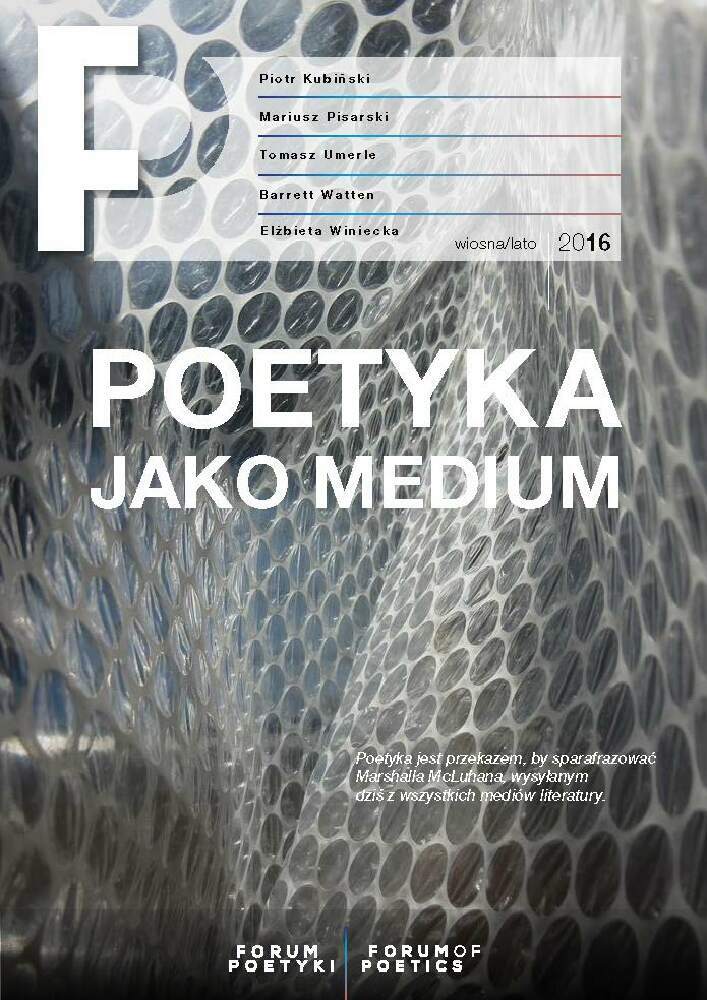Abstract
The author of the article presents the current situation and perspectives for future development of literary scholarship relating to the changing media environment and the development of new forms of writing activity on the Internet. She looks for answers to the question of where the borders of literariness online lie and how it is defined. The author further presents the current state of literary scholarship on the subject of the transformation of literature under the influence of digital media and related problems. The author cites a concept developed by Sandy Baldwin, who in the book Internet Unconsious (2015) shows new potential areas of study relating to these phenomena, demonstrating conclusively that this new interactive medium not only poses no threat to literature, but constitutes a natural area for its expansion. This calls for readiness on the part of literary scholars to embrace new theoretical and technological solutions.
References
Desai, Shiv Raj, i Tyson Marsh. „Weaving Multiple Dialects in the Classroom Discourse: Poetry and Spoken Word as a Critical Teaching Tool”. Taboo: The Journal of Culture and Education 9, nr 2 (2005): 71–90.
Edutopia. „Five-Minute Film Festival: The Power of Spoken Word Poetry”. Udostępniono 19 maj 2020. https://www.edutopia.org/blog/film-festival-national-poetry-month-spoken-word.
Glazner, Gary Mex. Poetry Slam: The Competitive Art of Performance Poetry. San Francisco, 2012.
Hall, H. B. „Origins of Spoken-word Poetry”, b.d. http://www.lessonpaths.com/learn/mmHosted/416178.
If I should have a daughter ... | Sarah Kay. Udostępniono 19 maj 2020. https://www.youtube.com/watch?v=0snNB1yS3IE.
Jarnkiewicz, J. „Slam, czyli wiersze na ringu”. W Najlepszy poeta nigdy nie wygrywa: historia slamu w Polsce 2003-2012, zredagowane przez Agata Kołodziej. Kraków, 2013.
Jastrzębska, J. „(R)ewolucja performatywna zjawisk scenicznych. Od salonu do slamu”. W Najlepszy poeta nigdy nie wygrywa: historia slamu w Polsce 2003-2012, zredagowane przez Agata Kołodziej. Kraków, 2013.
Kołodziej, Agata. Najlepszy poeta nigdy nie wygrywa: historia slamu w Polsce 2003-2012. Kraków, 2013.
Neal, Larry. „The Black Arts Movement”. The Drama Review 12, nr 4 (1968). http://www.aspresolver.com/aspresolver.asp?BLTC;S11315.
Orzeł, J. „Historia slamu w Polsce 2003–2012”. W Najlepszy poeta nigdy nie wygrywa: historia slamu w Polsce 2003-2012, przez Agata Kołodziej. Kraków, 2013.
Smith, Marc Kelly. The Complete Idiot’s Guide to Slam Poetry. New York, 2004.
„Snapshot”. Udostępniono 19 maj 2020. https://www.edutopia.org/blog/film-festival-national-poetry-month-spoken-word.
Somers-Willett, Susan B. A. Cultural Politics of Slam Poetry: Race, Identity, and the Performance of Popular Verse in America. University of Michigan Press, 2010.
Somers-Willett, Susan B. The Cultural Politics of Slam Poetry Race, Identity, and the Performance of Popular Verse in America. Michigan, 2009.
Stokfiszewski, I. „Poetry slams zdobywają coraz większą popularność”. W Najlepszy poeta nigdy nie wygrywa: historia slamu w Polsce 2003-2012, zredagowane przez Agata Kołodziej. Kraków: Hub Wydawniczy Rozdzielczość Chleba Fundacja Liternet, 2013.
Wheeler, Lesley. Voicing American Poetry: Sound and Performance from the 1920s to the Present. New York, 2008
License
Authors of articles are responsible for securing the rights to other publications (texts, tables, drawings and other illustrations) quoted or reproduced in their texts.
